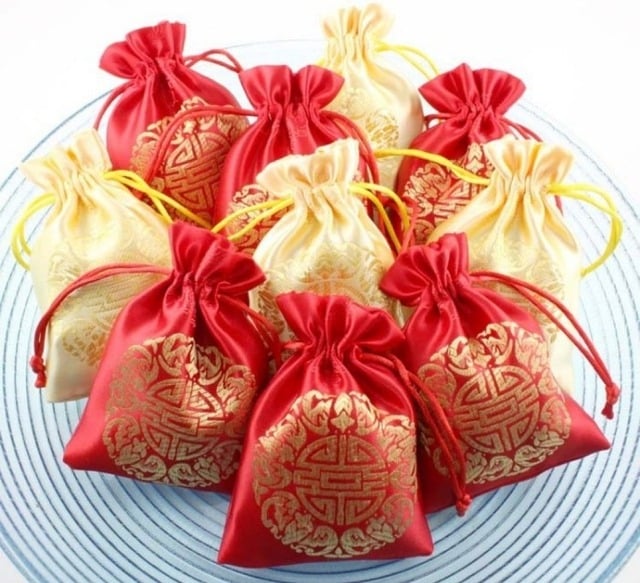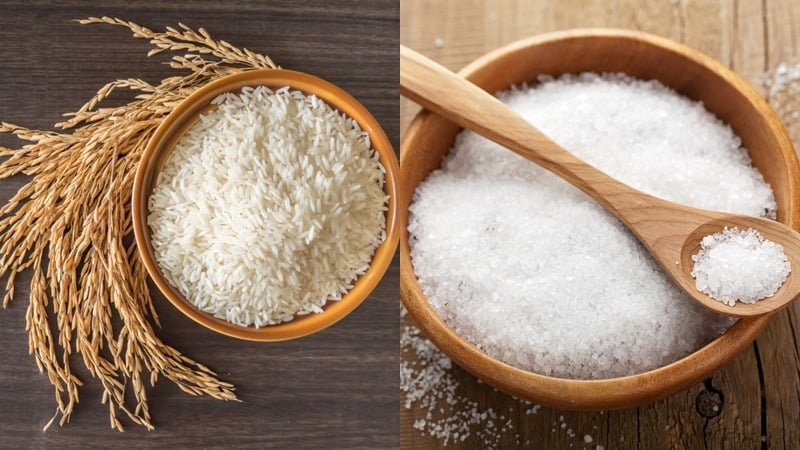What to Do With Rice and Salt After Worship?
During death anniversaries, the 1st and 15th of the lunar month, or during the Lunar New Year, many families offer rice and salt during their worship. However, afterward, they casually scatter them on the street, unaware that this action may unintentionally cause a loss of fortune and luck for themselves and their loved ones.
The method of scattering rice and salt after worship varies depending on the region. In some places, this is seen as a way for the deceased to enjoy the offerings. Some people, when visiting temples or going out during the Lunar New Year, happily carry eye-catching red bags of rice and salt from the temple, believing that it is a blessing from the deities, bringing luck and fortune. Thus, they keep them until they spoil before discarding them.

The method of scattering rice and salt differs based on regional customs.
In contrast, some families cook and consume the rice and salt as usual after worship, or they believe that the offered rice and salt have become ‘cold’ and should be burned with votive paper, considering it a neat practice and hoping to bring good luck to the family.
Unfortunately, many families encounter conflicts and disharmony, leading to strained relationships and negatively impacting their mental well-being. Apart from actively fostering love and seeking to resolve conflicts, according to Feng Shui expert Master Phung Phuong, some Feng Shui measures can be applied to improve the situation.
While folk beliefs suggest that rice and salt offered during domestic worship can be consumed, experts advise that this practice should only apply to rice and salt offered to ancestors within the family. Typically, people scatter rice and salt around the outer perimeter of their homes. However, many make the mistake of scattering them haphazardly, leading to a loss of fortune and a decrease in luck and financial prosperity for themselves and their loved ones.
So, where should the rice and salt be kept after worship, and how can we avoid violating any taboos?
Selecting High-Quality Rice and Salt for Worship
When preparing for worship, the selection of rice and salt should not be taken lightly. These offerings represent one’s sincerity and respect, so it is essential to choose high-quality products.
The rice should be fresh, fragrant, and free from husks, grass, or any signs of mold. Newly harvested rice is the ideal choice.
Salt, on the other hand, must be pristine white, free from impurities, and unchanged in color.
Never reuse rice and salt that have been used for previous offerings.

Fresh, fragrant rice, free from impurities, is essential for worship.
Methods of Scattering Rice and Salt After Certain Worship Rituals
According to Feng Shui expert Ha Thanh, after worship, rice and salt should not be scattered indiscriminately. The purpose of this act is to make offerings to the deceased, so the host should scatter the rice and salt along the walls or at the base of trees outside the house. While scattering, one should chant prayers to expel unclean spirits from their living space, office, or place of business. Depending on the occasion, here are some ways to handle the rice and salt after worship:
Handling Rice and Salt After Death Anniversaries
During death anniversary ceremonies for ancestors, rice and salt are usually placed on the altar along with votive paper, betel and areca nuts, fruits, and vegetarian or meat dishes, depending on regional customs. After the ceremony, the rice and salt can be dealt with in the following ways:
Since these offerings are meant for the ancestors, they can be consumed afterward. Alternatively, the plate of rice and salt can be taken outside and burned along with the votive paper to expel negative energy and prevent any remaining items from affecting the host’s life.
Handling Rice and Salt After the Kitchen God Worship
At the end of the year, many families have a tradition of offering rice and salt during the Kitchen God worship. This rice and salt can be scattered around the outer perimeter of the house to expel negative energy. Additionally, some people keep a portion of the rice and salt offered to the Kitchen God in their homes, considering it a ‘blessing’ that brings fortune and luck to the family (though this practice depends on the beliefs of each family and region).
Rice and Salt After Lunar New Year’s Eve Worship
The Lunar New Year’s Eve worship, also known as the Farewell Year Worship, is one of the most important ceremonies, marking the end of the old year and the beginning of the new one. During this ceremony, families offer rice and salt to heaven and earth, praying for good health, peace, and luck in the coming year, and expressing their respect and invitation to their ancestors to return home for the Lunar New Year celebration. According to Feng Shui experts, the rice and salt offered during this worship should be scattered around the outer perimeter of the house to make offerings to the deceased.
Rice and Salt Offered to the God of Wealth
After worshiping the God of Wealth, the host should keep the jar of rice and salt in the inner corner of the altar dedicated to the God of Wealth to attract fortune and support prosperous business endeavors. When the quality of the rice and salt diminishes, they should be replaced with new ones.
If the rice and salt are offered on the God of Wealth’s birthday, they should be scattered in front of the house to expel negative energy and invite good fortune, which is beneficial for the host’s business and financial ventures.
Rice and Salt After Ancestral Worship
During ancestral worship and hungry ghost festivals (the 7th lunar month), rice and salt are essential offerings meant to make offerings to wandering souls without living descendants to make offerings for them.
Experts advise scattering the rice and salt around the outer perimeter of the house, throwing them in multiple directions. The host should stand inside the house and throw the rice and salt outwards, never throwing these offerings back into the house.
Rice and Salt Used in Baby’s First Month Celebration Worship
The worship ceremony for a baby’s first month includes various offerings, among which rice and salt are indispensable. After the ceremony, the host scatters the rice and salt outside the house while chanting prayers, asking the spiritual world to bring blessings and take away misfortunes.
Only after scattering the rice and salt, the votive paper, the green doll, and other offerings are burned, along with prayers for the baby’s well-being, growth, blessings, and luck.
Scattering this rice and salt inside the house is not recommended, as it may invite negative energy, which is not beneficial for the baby or the family members.
Rice and Salt Offered During Grand Opening and Groundbreaking Ceremonies
In the past, rice and salt were believed to symbolize luck, health, and wealth, driving away negative energy. Thus, they are essential offerings during grand opening and groundbreaking ceremonies.
After the worship, the rice and salt are scattered on the road, with the host wishing for prosperous business or smooth construction work.
There are still many debates about the proper handling of rice and salt. Therefore, depending on the family and regional customs, the host can choose the most suitable method. It is important to scatter the rice and salt outside the house’s premises (outside the gate if there is one) while chanting “Nam Mo A Di Da Phat” to invite blessings and expel misfortunes. The crucial aspect is the host’s sincerity and respect during worship, which will be reciprocated with good things. It is also essential to avoid taboos to ensure a smooth and effective ceremony that aligns with local beliefs.
The Three-Legged House: A Tale of Unity and Strength
In the realm of ancient beliefs, a house with a “three-legged” defect is thought to bring about a myriad of troubles for its inhabitants. This superstition suggests that those residing in such a home may encounter numerous obstacles and bad luck in their lives, with potential consequences even as dire as affecting the homeowners’ mortality.
The Perfect Spot to Place Your Bed: Avoid the Deadly Mistake
Sleeping soundly in your bed, unaware that its placement could be a deadly mistake. It’s time to face the facts: the position of your bed can impact your health and well-being. It’s not just superstition – certain positions can bring bad luck and even danger. It’s crucial to understand these risks and make changes immediately to protect yourself from potential harm.


































